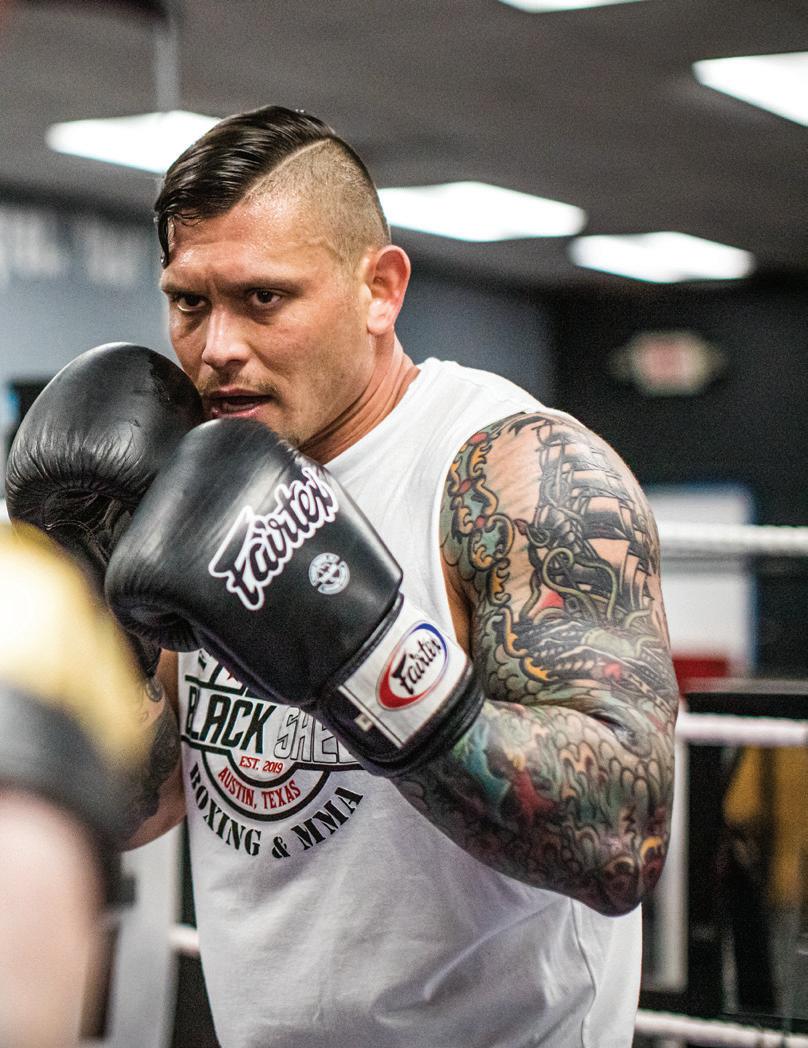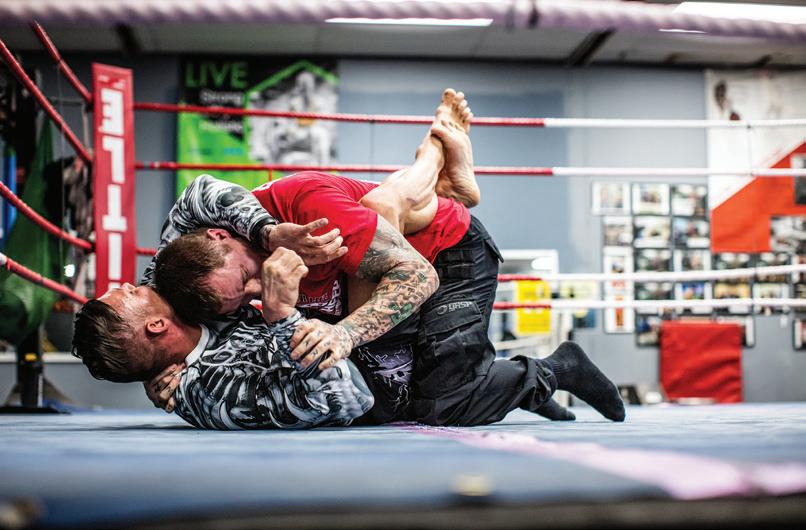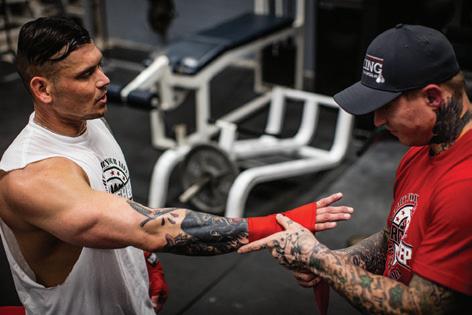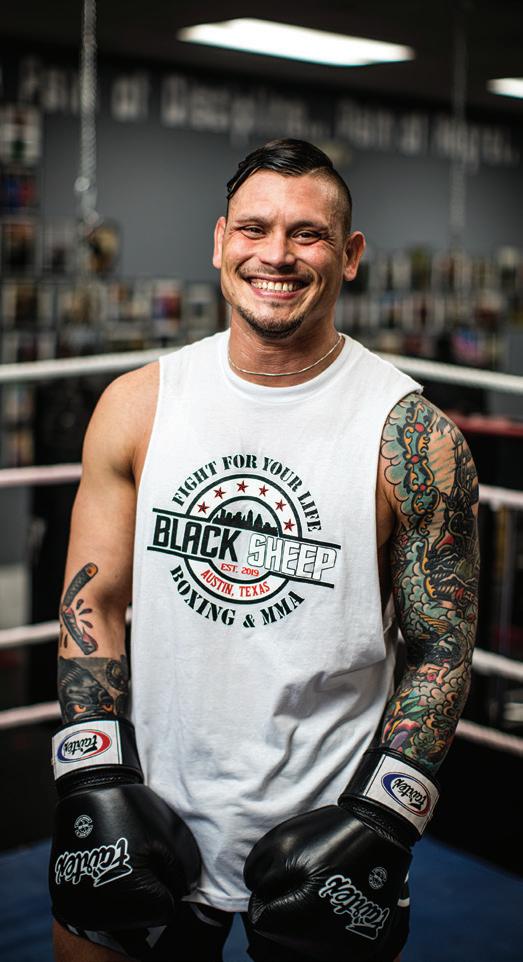
6 minute read
Fighting Fighting for a Second Chance
How combat sports changed one man’s life — and how he’s working to pay it forward.
By: Monica Hand

Photo by Brian Fitzsimmons.
Mixed martial arts is a brutal sport. The combination of fighting styles and the one-on-one setup make it perhaps the ultimate test of primal instinct, tactical skill and ability to take a hit. In the adrenaline rush from just watching a match, it can be easy to forget the human stories behind the fighters — both pro and amateur.
What brings these athletes to the caged octagon is often much deeper than just sheer, genetic strength and ability. For Tony Trevino, mixed martial arts (MMA) became the outlet he’d been looking for his whole life — the outlet that helped him realize the depth of his strength and ability to survive. Now, he’s working with Jeff Meadows to help others reach those same realizations.
For 16 years, Trevino battled a relentless addiction. Every time he got sober, the disease would knock him back down until he surrendered and broke — a cycle Trevino describes as “circling the drain.” Throughout that time, he’d had six trips to rehab, five overdoses, four DWIs, three stints in the Texas Department of Criminal Justice and two involuntary commitments to mental institutions.
“By the last year of my addiction, I was just hopeless, trying to survive and exist until that next fix,” Trevino explains. “It wasn’t even a high — it was just getting back to baseline.”
The last time he got sober, the time that stuck, he says, wasn’t because of a recovery facility, but because he had been arrested. By that time, he had been arrested and gone to prison enough times for the prosecution to charge him as a habitual offender. In the state of Texas, sentencing for a habitual offender starts out at 25 years.
“That was a wake-up call for me, facing 25 years. I made that 9-1-1 prayer to God saying that if there is any way I can avoid spending the rest of my life in prison, I’ll do it,” Trevino recalls.
Although options in county jail and penitentiary systems for drug and alcohol reform and treatment are limited, Trevino found that the 12-step program he had previously avoided worked for him.
“It’s the gift of desperation. Life had beaten me into submission, and I tapped out,” Trevino says. “I put my all into the 12-step program and gave up on that old lifestyle.”
Once out of prison, Trevino made a promise to himself that he would pursue the dreams that addiction had previously kept him from accomplishing. He got involved with Recovery Unplugged, which allowed him to stay in touch with the recovery community and help those still battling the disease, and two years into sobriety, he decided to finally pursue a long-time passion: mixed martial arts.

Trevino and Meadows at Big Tex Gym.
Brian Fitzsimmons.
“I always wanted to train and learn how to actually fight; I’d been a fan ever since UFC first started in the ‘90s, and I’d been in so many fights throughout my street life years,” Trevino explains. “But when you’re a career junkie, that lifestyle is not conducive to becoming a high-level athlete.”
Having been through so much, stepping into that first gym was intimidating, Trevino recalls. However, as soon as he began training in Muay Thai and sparring with others in the gym, a new kind of confidence began to take form inside him.
“The parallels between fighting addiction and training to fight in MMA made me realize just how strong I really am,” Trevino says. “There is a certain kind of confidence that comes with knowing you can handle yourself — that you can push yourself past your perceived limits.”
Even though he’s waiting to take on an official fight until he’s reached a certain level in jiu jitsu, sparring has taught him a lot about the respect between fighters. Even when sparring, Trevino explains, fighters give it their all and, being able to put themselves out there, deserve respect no matter the outcome of the session.
“It’s always funny to me how kicking and punching someone in the face who is kicking and punching me in the face creates a level of respect for one another,” Trevino says. “When you watch fights, you’ll see how even after some of the roughest fights, they always end up hugging and shaking hands after, because there’s an understanding about what it took.”
Trevino realized so much of his recovery was due to his devotion to physical fitness. The studies around exercise and recovery are growing, and the use of physical exercise is now widely seen as an additional resource in recovery programs.
The idea is that physical fitness allows for the chemical balance in the brain to naturally alter — releasing endorphins, serotonin, oxytocin and dopamine — and working out strengthens the mind’s muscles and its ability to deal with stressors. Plus, as Trevino points out, fitness can also change someone’s perceptions of themselves.
By working as a personal trainer and instructor and working to promote fitness through combat sports and personal training, Trevino says he hopes to be able to help clients rediscover their self-worth and confidence just as he did.
“They say you have to break someone down to build them back up, but by the time they come to me, the disease has already left them broken,” Trevino says. “I get to build them back up.”
After deciding to follow this model of using combat sports and personal training to underscore the benefits of recovery, Trevino got to the point where he was training groups at Infinite Recovery and working with various clients each week — and loving every minute of it.

Trevino and Meadows.
Photo by Brian Fitzsimmons.
“When you’re at that level of recovery, you’re on rock bottom, and many times, clients lose all of their self-worth,” Trevino says. “It’s so amazing to watch that selfconfidence come back in the clients through training and fitness.”
Recently, Trevino has joined forces with friend and owner of Black Sheep Boxing, Jeff Meadows. Trevino and Meadows met while both were working at a local treatment facility, and they clicked instantly. Then, when Meadows’ business started expanding, it was a no-brainer for him to bring Trevino on the team. The work Trevino and Meadows do, he says, is important and completely different from regular personal training and instructing.
“Individuals that are living a life of sobriety have gone through or are going through a certain amount of trauma,” Meadows explains. “Some days it’s beautiful and inspiring, while others are challenging and heartbreaking.”
Trevino says he’s lucky to have such like-minded friends that are also looking for the best ways to fill the lack of physical fitness-driven outlets for those in recovery. The two business partners have just landed a partnership with Big Tex Gym in Pflugerville where they plan to train their clients for now.
Looking to the future, Trevino and Meadows hope to continue their passion for helping those in recovery, such as working to create MMA training for a sober house designed around combat sports — a first of its kind.
“At the end of the day, if I can change someone’s way of thinking about themselves and their future into something positive,” Trevino says, “then it makes everything feel so worth it.”

Photo by Brian Fitzsimmons.










